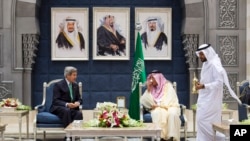CAIRO —
The United States has downplayed recent tensions with Saudi Arabia, but some in the region say the problems may not be easily pushed aside.
Saudi Arabia is having a fit of pique. The normally staid kingdom has rebuffed a seat on the U.N. Security Council, hinted it might go it alone on Syria, and most surprisingly, made clear its anger at long-time ally the United States.
Saudi editor and author Jamal Khashoggi spoke to VOA via Skype.
“What Saudi Arabia is probably worried about is that America is only interested in the nuclear issue with Iran, Israeli security, and they will leave to us the mess that we have in the Middle East to sort out ourselves," said Khashoggi.
The “mess” in the wake of the Arab Spring is extensive, from coups to civil war and growing religious strife. Saudi officials were furious over the U.S. reversal on military strikes against Syria's government, an ally of Saudi rival Iran. Frustration grew over Washington's handling of Egypt.
America's top diplomat called the ouster of an elected president "restoring democracy" but then Washington cut aid.
Political analyst Mustafa Labbad, director of the al Sharq Center for Regional and Strategic Studies in Cairo, says U.S. Mideast policy lately is seen largely as a series of missteps.
"You have to have a sophisticated plan as a super power. If you don't have it - so you wouldn't achieve anything," said Labbad.
Hovering over all is the sectarian struggle between Sunnis and Shi'ites - roughly translated in Saudi leaders' eyes as Saudi Arabia versus Iran. U.S. overtures to Tehran, in hopes of curbing Tehran's nuclear ambitions, do not help. Jamal Khashoggi:
“We panic about the notion that the relationship between Iran and the U.S. could warm up," he said.
Washington has downplayed the idea of a U.S. - Saudi rift, but former U.S. ambassador Adam Ereli says America needs to reassure its Middle East allies.
“We are neglecting them at our peril, because we need them. I think we are taking them a little bit for granted, frankly. And that includes Saudi Arabia," said Ereli.
Key strategic interests continue to bind the United States and Saudi Arabia - anti-terrorism and oil among the top issues. And ties include U.S. military sales to the kingdom and Saudi investment in the U.S.
Many think those will outlast the current tensions. But Khashoggi believes there may be a more fundamental change afoot.
“What is happening in the Middle East is a rebirth, something similar to what happened in 1918 after the fall of the Ottoman Empire. And it really needs stable, strong countries to manage that rebirth," he said.
Those countries, he hopes, will be Saudi Arabia, with Sunni partners such as Turkey. The question is if Iran envisions a Shi'ite version of that scenario. Analysts believe it likely does. The U.S. has yet to signal if it will continue its long, deep involvement in a reshaped Middle East.
Saudi Arabia is having a fit of pique. The normally staid kingdom has rebuffed a seat on the U.N. Security Council, hinted it might go it alone on Syria, and most surprisingly, made clear its anger at long-time ally the United States.
Saudi editor and author Jamal Khashoggi spoke to VOA via Skype.
“What Saudi Arabia is probably worried about is that America is only interested in the nuclear issue with Iran, Israeli security, and they will leave to us the mess that we have in the Middle East to sort out ourselves," said Khashoggi.
The “mess” in the wake of the Arab Spring is extensive, from coups to civil war and growing religious strife. Saudi officials were furious over the U.S. reversal on military strikes against Syria's government, an ally of Saudi rival Iran. Frustration grew over Washington's handling of Egypt.
America's top diplomat called the ouster of an elected president "restoring democracy" but then Washington cut aid.
Political analyst Mustafa Labbad, director of the al Sharq Center for Regional and Strategic Studies in Cairo, says U.S. Mideast policy lately is seen largely as a series of missteps.
"You have to have a sophisticated plan as a super power. If you don't have it - so you wouldn't achieve anything," said Labbad.
Hovering over all is the sectarian struggle between Sunnis and Shi'ites - roughly translated in Saudi leaders' eyes as Saudi Arabia versus Iran. U.S. overtures to Tehran, in hopes of curbing Tehran's nuclear ambitions, do not help. Jamal Khashoggi:
“We panic about the notion that the relationship between Iran and the U.S. could warm up," he said.
Washington has downplayed the idea of a U.S. - Saudi rift, but former U.S. ambassador Adam Ereli says America needs to reassure its Middle East allies.
“We are neglecting them at our peril, because we need them. I think we are taking them a little bit for granted, frankly. And that includes Saudi Arabia," said Ereli.
Key strategic interests continue to bind the United States and Saudi Arabia - anti-terrorism and oil among the top issues. And ties include U.S. military sales to the kingdom and Saudi investment in the U.S.
Many think those will outlast the current tensions. But Khashoggi believes there may be a more fundamental change afoot.
“What is happening in the Middle East is a rebirth, something similar to what happened in 1918 after the fall of the Ottoman Empire. And it really needs stable, strong countries to manage that rebirth," he said.
Those countries, he hopes, will be Saudi Arabia, with Sunni partners such as Turkey. The question is if Iran envisions a Shi'ite version of that scenario. Analysts believe it likely does. The U.S. has yet to signal if it will continue its long, deep involvement in a reshaped Middle East.










